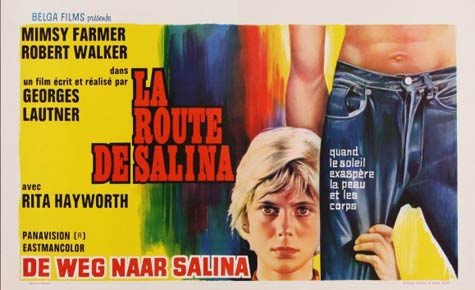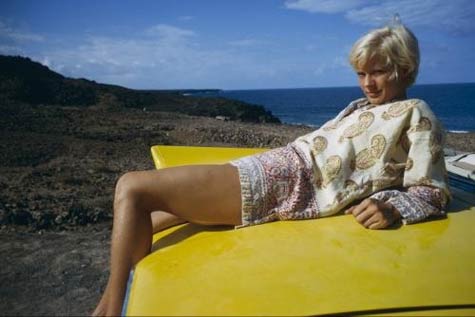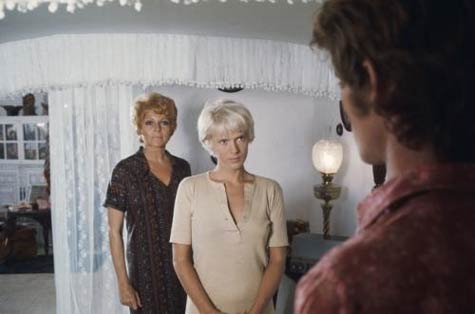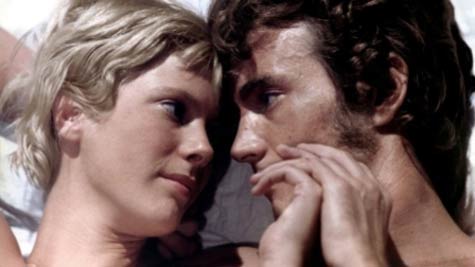
There’s enough curious tidbits about the 1970 movie Road to Salina to fill up the space of this article, if we wanted to delve fully into those items. But the film itself needs to be discussed so I’ll suffice with a quick overview of some of those interesting notes. It was the last movie acted in by Ed Begley, who died the same year it was released. It was the third-to-last for Rita Hayworth, and her role as an out-to-lunch marm is eerie when you consider that she was later diagnosed with Alzheimer’s disease. It was the only English language movie directed by Georges Lautner, who was a household name in his native France if not a universally appreciated auteur. The film is based on the French novel Sur La Route de Salina, penned by the ridiculously obscure writer Maurice Cury. The theme to its soundtrack (which is stunningly good) was used by Quentin Tarantino in Kill Bill Vol 2.
There’s nothing particularly strange about the actors who played the two lead roles, but they’re both intriguing thespians. Mimsy Farmer, a quirky American beauty who had recently moved to Europe (she’s never left) and was just beginning a run of notable Euro art house film appearances, portrays a sexy psycho chick in a role not completely dissimilar to the one she’d done the year before in Barbet Schroeder’s cult classic More. The main male part, a hippy drifter, is ably handled by Robert Walker, Jr. son of acting people Jennifer Jones and Walker, Sr. (film noir lovers might remember Walker, Sr.’s beautifully perfect portrayal of the creepy Bruno in Alfred Hitchcock’s Strangers on a Train).
I wish I could check out Cury’s novel so I could know how much Lautner did or didn’t take from it, but the book is such a rare item that it seemingly can’t be tracked down in its original language, never mind in an English translation that I could read. But the story of the movie, which was shot on the Canary Islands, is such: Walker is Jonas, a long-faced young vagabond who’s meandering down a deserted road near the sleepy town of Salina. When he spots a roadside abode with a well out in front of it, he helps himself to a splash and a couple guzzles. What he doesn’t know is this spontaneous detour will change his life. Mara (Hayworth), the nutty broad who runs the place—which turns out to be a combination gas station and lunch counter—steps outside and, spotting the hippie sheepdog slurping her agua, decides on the spot that he is her son Rocky, who disappeared years before. Jonas gets it that the lady is cracked and has no idea who this Rocky guy is, but when the woman welcomes him inside for some grub and a nap, he takes the path of least resistance and plays along.

If Mara is enough to give the wanderer’s noggin a good rattling, he experiences something more like a complete brainf**k when he gets to know his “sister,” Billie. Brilliantly portrayed by Farmer, who excelled at playing unhinged femmes fatales, Billie is a peculiar type of sibling: one who purposely lets her brother see her showering in the nude, and who drags him away from the shack to go on an overnight party on the beach where they sleep in a tent near the shore-break and don’t bother with clothing. Billie seriously messes with the head of the already psychologically vulnerable Jonas, by not letting him know whether she actually believes he’s her brother, not to mention by welcoming him to fall in love with her.

Begley is a single man who lives nearby and who’s sweet on, and protective of, Mara. His character Warren is the only one around who makes it known to Jonas that he knows he’s not actually Rocky. But in doing this Warren asks Jonas to play along and pretend to be the guy, for the sake of Mara, who is so happy to have her long-lost son back home. If it wasn’t for his attachment to Billie, the drifter would probably run screaming from the place and return to his wandering; but his alluring/scary “sister” has him by the brain and the balls, and because of this he gives in and becomes Jonas, for better or worse.
The movie has a grainy look and an existentialist bend, befitting of a film made by a Frenchman. It contains suspense elements (what happened to the actual Rocky and what is going to become of Jonas’s taking on his identity?), free love sexuality, exotic scenery, generation gap disconnects, and does-a-number-on-your-head oddness. It makes me think of another classic moody film about somebody taking on another’s identity: Michelangelo Antonioni’s excellent 1975 feature The Passenger, starring Jack Nicholson. All four of the main acting people are stellar in their roles, but for me Farmer’s electric delivery in playing the mercurial Billie is the showstopper.

The tale—a surreal mystery story—is compelling, but the real force of the film is its atmosphere. The hazy look of the reels, the deadpan tone used by Walker in his many voice-overs, the sun-baked feel of the gas station/house, and the palpable loneliness in Mara’s heart—all of these elements combine together to create a dense feeling that goes to a deep place in the viewer’s insides. The Pink Floyd-esque soundtrack by French pop star Christophe and his experimental band Clinic adds to the heady tone. And as a side-splitting bonus, Hayworth and Begley perform the frug along the way.
Lautner is a study in himself. Over his decades-long filmmaking career, he directed the likes of Jean-Paul Belmondo, Jean Gabin, and Alain Delon. Lautner was thought of so highly in France that when he died in 2013, Francois Hollande publicly commented on his passing. Just as I wish I could read the novel Road to Salina is based on, I regret that I’m not able to contact Lautner and ply him with questions about this picture. The director often self-deprecatingly said that he merely set out to make simple entertainments on celluloid, yet this film is as complex and offbeat as it gets. Critics have never seemed to know what to make of it. But if you can get into its rhythms and if it’s the kind of story that moves you, it will transport you while you’re watching it, and stay with you long after.
Brian Greene's short stories, personal essays, and writings on books, music, and film have appeared in more than 20 different publications since 2008. His articles on crime fiction have also been published by Crime Time, Paperback Parade, Noir Originals, and Mulholland Books. Brian lives in Durham, NC with his wife Abby, their daughters Violet and Melody, their cat Rita Lee, and too many books. Follow Brian on Twitter @brianjoebrain.

I remember Robert Walker, Jr. playing Charlie X in a first season episode of Star Trek and thought he had put on a performance as worthy as his famous father. One of those talents that should have been more recognized.
He’s impressive in Salina. He and Mimsy Farmer play off each other well. I learned from IMDB that he’s still going, too, just acted in a feature film in 2012.
Glad to hear Mr. Walker is still in the game. And you have me checking up on Hayworth. By the early seventies (according to Wikipedia) she could not remember her lines (due to
Alzheimer’s) and on one movie set, she filmed her scenes one line at a time. Yep, ROAD TO SALINA has quite a few curious tidbits. But, most importantly, it sounds like a terrific film to watch.
Brian, I really enjoyed reading this. ROAD TO SALINA was a regular staple way way back on the early HBO in the late 70’s, and I remember watching it then at least once. My friends and I in high school actually would talk about it because it was such a weird film, and of course to being seeing that kind of uncut stuff in the early days of cable, as a teenager, was a lot of fun. So this article brings back memories. I haven’t seen it since then and now I’m eager to see it again.
David: It really is eerie to think about the state Rita was in personally while playing that role. She’s perfect in it, of course.
Scott: That sounds like a lot of fun, to have watched it with friends and talked about it and all.
Glad you both like the piece. I loved writing it.
is it available for download anywhere? Any links pls?
@dionysus: sorry, but to my knowledge it’s not available online.
I know this is an old thread, but if anyone is still looking for this movie, I watched it on Kanopy last night (streaming app free for use with a library card).
Thanks to Brian Greene for his review of Road To Salina.
I am Phil Brigham, guitarist for the band Clinic, not to be confused with an electronica band from Liverpool that came after us.
We were not Christophe’s band, but rather we were our own band.
The music from Road to Salina came from 3 sources, Christophe, a French pop singer, Us (Clinic) , and orchestral stuff listed as being by Christophe, but actually by an excellent film score writer named Bernard Girard. Two songs from Salina were later used in Kill Bill Vol. 2……The Chase by Clinic, and Sunny Road To Salina by Christophe/Girard.
Sunny Road to Salina does sound kind of Pink Floyd like, which is no accident. Pink Floyd, although virtually unknown in the U.S. at the time were approached to do music for Salina, but were reportedly too expensive. Which was a lucky break for the almost brand new band I was in…the other break being the film people wanted more rock sounding songs than Christophe was doing at the time.